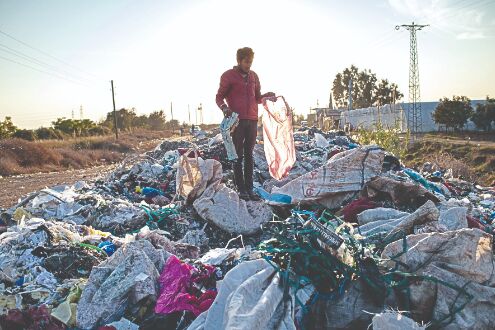Food for nothing
The pandemic has upped food delivery orders and has as a consequence, also exponentially increased the generation of unrecycled plastic waste

Food makes the world go round. Wait, did you say love? Well, that too, but nothing comes easy on an empty stomach. Not even love. Therefore, my evolved adage is that food makes the world go round. It's not surprising to see that food delivery has grown exponentially during the pandemic. With our movements curtailed keeping Covid protocol and safety in mind, getting food from our favourite eatery delivered to our doorstep has been a blessing; not just to sustain ourselves with nutrition but to simply give a semblance of normalcy. And obviously, food makes most of us incredibly happy and satisfied. But while we read numerous headlines on the food saviours of Covid (read: food delivery companies) and their fantastical increase in valuations and/or latest funding, a major by-product of enhanced food orders is under-reported — the colossal waste that it creates!
The excessive use of plastic in the packaging has been on my mind, and as I myself, started ordering more and more from the likes of Swiggy and Zomato, the problem of waste generation emerged as the most obvious and worrying consequence of take-outs. A recent news report echoed my thoughts and on closer inspection, I found, that there were indeed very few reports that had endeavoured to highlight this gnawing problem. Zomato, for example, reported order volumes of 200 million just in the first half of the financial year, 2020. Swiggy, doesn't share order numbers but has been reporting robust growth. Add to this, would be direct orders and other modes of online deliveries and we have huge volumes of sale on our hands that generate millions of tonnes of unrecycled plastic.
Every year, India produces about 62 million tonnes of solid waste. A spike in online food orders means that much more plastic is being used in packaging — those ugly white boxes, disposable cutlery, plastic wrappers etc. Though there is a plastic ban, in places such as Kolkata and Goa, food deliveries are still using plastic bags. Restaurants are sending them and delivery partners are using them for their own ease of transporting the food. Cities such as Bengaluru and Delhi have fared much better on this count using biodegradable brown paper bags instead but many have yet to turn more vigilant and stricter on the implementation of the plastic ban.
Plastic is cheap, convenient, spill-proof, and therefore, travels better. And even while food delivery companies such as Zomato and Swiggy are educating restaurant partners about eco-friendly packaging, delivery executives complain that often customers refuse to accept deliveries that are not packed in plastic boxes. The education and awareness, therefore, must extend to the end consumer as well. Little things such as refusing cutlery while placing an order, and efficient segregation of waste (most Indian cities and municipal corporations are lagging behind on this front) would go a long way in reducing our carbon footprint. Remember that unrecycled plastic gets embedded deep into the soil and poisons the earth for years to come. Plastic, ultimately, also leads to global warming and climate change. And India disposed of 235 million food boxes in 2018; the number would be far greater for 2020.
The increase in waste caused by food delivery is not limited to India alone. China is choking with plastic; 1.6 million tonnes of packaging waste was produced in 2017. According to news reports, of this, 1,75,000 tonnes was made up of disposable chopsticks, 1,64,000 tonnes of plastic bags, and 44,000 tonnes of plastic spoons. In the US, food packaging made up 45 per cent of its landfills. This is a global problem that requires urgent attention and innovative solutions.
Most importantly, pro-environment packaging must become cheaper and more convenient. There are biodegradable food boxes and cutlery, but they come at a higher cost than plastic. Governments could offer sops to companies who use biodegradable materials, food delivery companies could reward restaurants and cloud kitchens who go green, who in turn could pass on some loyalty points and freebies to customers. We can envisage a reward system that has a top-down effect and incentivise people to make better choices. We are a nation that beats 'thalis' (plates) on balconies when instructed, therefore, a national campaign to reduce the use of plastic would also improve awareness. The Climate Clock as of today, says that we have 6 years 350 days to achieve zero emissions. We have to act now.
The writer is an author and media entrepreneur. Views expressed are personal



